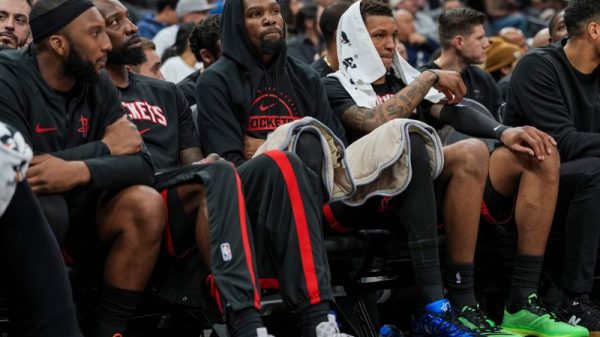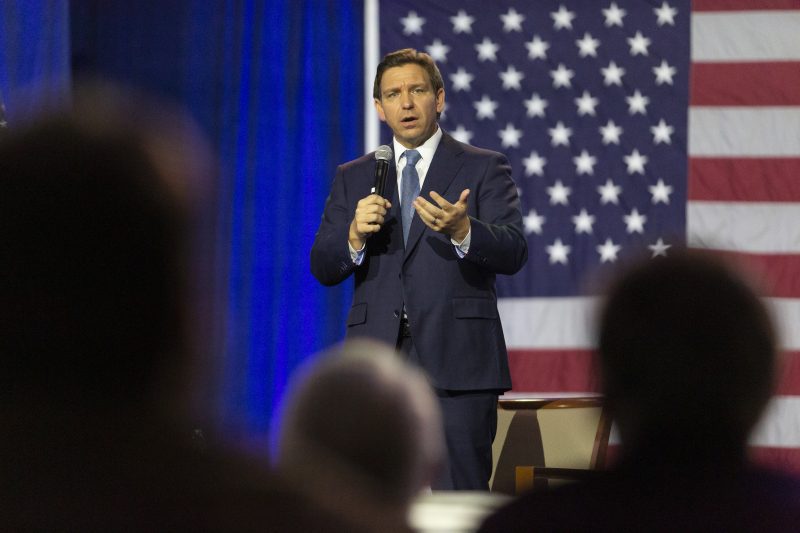Florida Gov. Ron DeSantis’s jabs at Donald Trump have been significantly milder than either Trump’s allies or Piers Morgan would lead us to believe. Morgan, writing in the New York Post, says that in an interview airing Thursday on Fox News, DeSantis “has finally taken the gloves off and launched a blistering attack on his former mentor.” Nothing in the article amounts to “gloves off,” but the interview does feature a rather notable potential opening salvo in a Trump-vs.-DeSantis primary matchup.
“Truth is essential,” DeSantis (R) said. “We have to agree that there’s a certain reality to the world we live in, and if we can just create our own facts, then we’re never going to be able to agree on anything or never really be able to do policy in a way that makes sense. And so, yes, it’s not your truth or my truth; it’s the truth.”
DeSantis was responding directly to a question about the topic. But it would seem to suggest that Trump’s unceasing barrage of 30,000 false and misleading claims could be on the table in a matchup that DeSantis would apparently like to revolve around character issues. (DeSantis on Monday seemed eager to mention the sordid particulars of Trump’s current legal problems.)
At the same time, such a tack would cast a spotlight on an exceedingly uncomfortable question for DeSantis: What about the 2020 election?
When it comes to perhaps the most disputed truth of the last two-plus years, DeSantis has been consistently and conspicuously MIA. Over and over, he has punted on whether President Biden was legitimately elected.
This dance began as Trump was still contesting his defeat before the Jan. 6 insurrection:
In mid-December 2020, DeSantis was asked whether he accepted Biden’s win, and he said, “It’s not for me to do.” He added that “the [electoral] college voted,” and, “What’s going to happen is going to happen.” But it wouldn’t be the last time he would stop short on the question.In June 2021, a reporter asked, “I want to ask you again, directly, do you believe the 2020 presidential election was rigged?” DeSantis responded merely that Florida, which Trump won, did a good job with its election.When the same question was asked in June 2022, DeSantis responded, “I’ve been asked that a hundred different times.” But he still wouldn’t commit, saying, “Let’s focus on things that are concerning American people today, and helping us get through this period here today.”“I’ve been asked that a hundred different times,” he said again in August while campaigning for Republican election deniers. “Anyone have a question on the topic of the day?”
DeSantis didn’t claim the election was stolen like those candidates did, and he hasn’t put questions about the matter front and center — though he has occasionally derided practices such as ballot harvesting. But he has also made moves that were clearly intended to cater to that crowd.
In 2021, he signed into law new voting restrictions even after hailing Florida’s 2020 election as a beacon. Last year, he signed a bill creating an election police unit and later played up 20 arrests it made. (Many of those arrested were convicted felons who appeared to think they were eligible to vote and were even given voter registration cards.)
DeSantis also appointed a secretary of state last year with ties to the election-denier movement — similar to his hiring of a coronavirus vaccine skeptic as state surgeon general. The appointee, Cord Byrd, also declined to say whether Biden’s victory was legitimate.
The goal is evident: Avoid alienating the strong majority of Trump supporters and Republicans who believe the election was stolen — and even appeal to them. But the cost is also evident: Not to deny the deniers is to avoid the kind of mutually recognized truth that DeSantis now says is so “essential” to moving the country forward.
It’s a topic DeSantis can probably punt on only for so long. Should he enter the 2024 race, he’ll most likely be on a debate stage with a former president who remains intent upon claiming that the 2020 election was stolen. The temptation for Trump to say that will probably be even stronger if he’s standing next to the guy who is fresh off a 19-point reelection win in Florida and looking to make his superior electability a key issue.
But for electability to truly be DeSantis’s issue, it would seem helpful to establish that Trump did actually, legitimately lose. We’ll see if DeSantis is really interested in uniting Americans around a common set of facts.



























